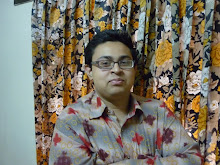The previous post was perhaps too serious and controversial.
Well lets move on.
Most of the times it is easier for us to understand the brain when it has undergone derangements in selective areas. This aspect has been exploited brilliantly by Dr. Vilayanur ramachandran in his talks at Ted.com.
Do comment on the ideas put forward by him. Finally somebody who is getting the basics right!!
1. http://www.ted.com/talks/lang/eng/vs_ramachandran_the_neurons_that_shaped_civilization.html
2. http://www.ted.com/talks/lang/eng/vilayanur_ramachandran_on_your_mind.html
Thursday, June 24, 2010
Sunday, May 30, 2010
Gray matters
Welcome readers!! Here goes my first blog!
Brain is one of the most mysterious and important organs of our body. All we know is that it is an organ that makes us human, so to say, allows us to sense the world, keeps the vital functions active, maintains balance and co-ordination, helps us to act, remember and rationalize. Weighing about 1.4 kilograms in an average adult, it has some 100 billion neurons that are somehow able to synchronize themselves in order to support life.
Needless to say, it has been most difficult to decode the workings of this sophisticated device.
However, the never say die attitude of many eminent people have led us to develop some insight into the underlying mechanisms of the human brain.
All said and done, lets dip into the vast world of interesting and mysterious topics about the human brain (or 'gray matters') and try to understand more about ourselves.
Brain is one of the most mysterious and important organs of our body. All we know is that it is an organ that makes us human, so to say, allows us to sense the world, keeps the vital functions active, maintains balance and co-ordination, helps us to act, remember and rationalize. Weighing about 1.4 kilograms in an average adult, it has some 100 billion neurons that are somehow able to synchronize themselves in order to support life.
Needless to say, it has been most difficult to decode the workings of this sophisticated device.
However, the never say die attitude of many eminent people have led us to develop some insight into the underlying mechanisms of the human brain.
All said and done, lets dip into the vast world of interesting and mysterious topics about the human brain (or 'gray matters') and try to understand more about ourselves.
Brain - the seat of all activities ??
So the brain is supposed to control all the voluntary and involuntary activities that makes up life. However, we do not really have definite proof for that. All we can say such and such parts of the brain are active during this and that activity. But that is merely the firing of the neurons, which can by no means be random. So, there is probably a master control that works behind it. Is that control in the brain, or could it even be elsewhere?
Nobel laureate Dr. Richard P. Feynman has raised a similar question in his book titled "Surely, you're joking, Mr. Feynman!".
Our ancient Vedic literature states that our vital energy lies at the base of our spine (coccyx) in latent form (Muladhar Chakra).
If we consider Human embryology, one of the first things to develop is the notochord (primitive vertebral column) and then the neural tube (that gives rise to the spinal cord). The brain starts forming comparatively later.
So, can the seat of all activity develop after the some of the other parts of the body have already started forming? Well, since that is probably not the case, it is more likely that such a 'master control' lies in the neural tube or spinal cord in adults. Or is it still somewhere else?
I would like my readers to comment on the issue, and rack their brains!!
Nobel laureate Dr. Richard P. Feynman has raised a similar question in his book titled "Surely, you're joking, Mr. Feynman!".
Our ancient Vedic literature states that our vital energy lies at the base of our spine (coccyx) in latent form (Muladhar Chakra).
If we consider Human embryology, one of the first things to develop is the notochord (primitive vertebral column) and then the neural tube (that gives rise to the spinal cord). The brain starts forming comparatively later.
So, can the seat of all activity develop after the some of the other parts of the body have already started forming? Well, since that is probably not the case, it is more likely that such a 'master control' lies in the neural tube or spinal cord in adults. Or is it still somewhere else?
I would like my readers to comment on the issue, and rack their brains!!
Subscribe to:
Comments (Atom)



